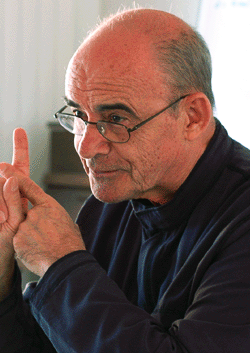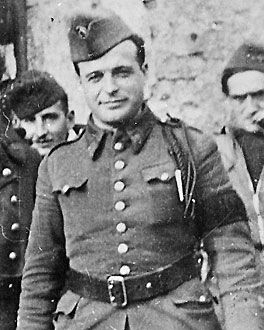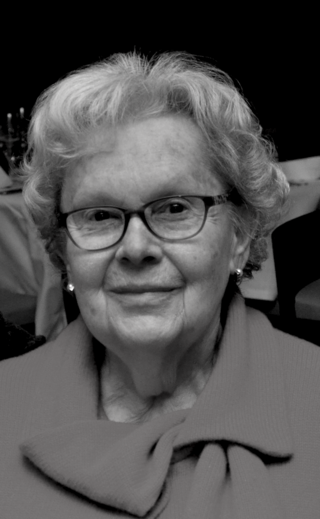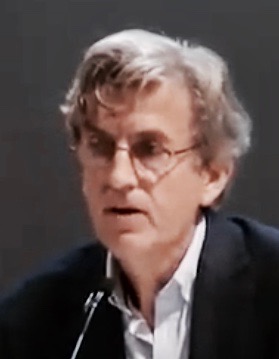Danielle Cohen-Levinas (born 21 April 1959 in Paris) is a French philosopher, musicologist, and a specialist of Jewish philosophy.
Danielle Cohen-Levinas (born 21 April 1959 in Paris) is a French philosopher, musicologist, and a specialist of Jewish philosophy.
A pianist by training and former graduate of the Conservatoire de Paris, Danielle Cohen-Levinas followed a double course in philosophy and musicology at the Université Paris Sorbonne-Paris IV [1] and the Université Paris-1 Panthéon-Sorbonne. She entered Radio France in 1982 (France Musique and France Culture) where she worked as a radio producer until 2005.
Danielle Cohen-Levinas defended a thesis (1992) and an authorization to conduct research in philosophy (1994) at the Université Paris-1 Panthéon-Sorbonne. She was called upon to the IRCAM directed by Pierre Boulez and appointed editor in chief of the magazine Inharmoniques then Cahiers de l'IRCAM between 1989 and 1993.
She was a resident at the Villa Medicis in Rome in 1992 and returned to the CNRS in 1993 at the "Laboratoire des Arts du spectacle" then the "Laboratoire d'esthétique" of the Université Paris I Panthéon-Sorbonne where she taught as associate professor and remained there until 1998. She was program director at the Collège international de philosophie between 1996 and 2002.
Named professor of music aesthetics and philosophy of music at the Paris Sorbonne-Paris University in 1998, Danielle Cohen-Levinas founded in 1998 the "Centre d'esthétique, musique et philosophie contemporaine". In 2008, she founded and directed the "Collège des études juives et de philosophie contemporaine" [2] which she renamed Centre Emmanuel Levinas (EA 3552) in 2012. She has been a research associate at the Husserl Archives of Paris at the École Normale Supérieure of rue d'Ulm (ENS-CNRS) [3] since 2008 where she works more specifically on the work of Emmanuel Levinas and on his influence in international research. It is within the framework of the "Collège des études juives et de philosophie contemporaine" that she took the initiative in December 2016, in collaboration with Perrine Simon-Nahum, to ensure the revival of the "Colloque des Intellectuels juifs de langue française" (NCIJLF).
Alongside her research in aesthetics and philosophy of music, in contemporary philosophy and post-phenomenology in France, Danielle Cohen-Levinas deploys a work in Jewish philosophy, [3] around the Judeo-German moment (H. Cohen, F. Rosenzweig, G. Scholem, L. Strauss ... ) and the Frankfurt School (Adorno, Benjamin, Bloch ... ), as well as around the revival of biblical and Talmudic studies in Europe from a philosophical point of view.
Since 2007 she has been editorial advisor by the Éditions Hermann and director of the philosophy series Le Bel Aujourd'hui which she founded the same year. In 2010, she created by Éditions Hermann a series intended to host collective works: the Rue de la Sorbonne series and, in 2011, a series devoted to Jewish thought and studies, "Panim el Panim". [1] She is the president of Les Cahiers Maurice Blanchot, which she co-founded with Monique Antelme and Mike Holland in 2010.
Danielle Cohen-Levinas is married to composer and pianist Michaël Levinas.

Emmanuel Levinas was a French philosopher of Lithuanian Jewish ancestry who is known for his work within Jewish philosophy, existentialism, and phenomenology, focusing on the relationship of ethics to metaphysics and ontology.

Jean-Luc Nancy was a French philosopher. Nancy's first book, published in 1973, was Le titre de la lettre, a reading of the work of French psychoanalyst Jacques Lacan, written in collaboration with Philippe Lacoue-Labarthe. Nancy is the author of works on many thinkers, including La remarque spéculative in 1973 on Georg Wilhelm Friedrich Hegel, Le Discours de la syncope (1976) and L'Impératif catégorique (1983) on Immanuel Kant, Ego sum (1979) on René Descartes, and Le Partage des voix (1982) on Martin Heidegger.
Étienne Henri Gilson was a French philosopher and historian of philosophy. A scholar of medieval philosophy, he originally specialised in the thought of Descartes; he also philosophized in the tradition of Thomas Aquinas, although he did not consider himself a Neo-Thomist philosopher. In 1946 he attained the distinction of being elected an "Immortal" (member) of the Académie française. He was nominated for the Nobel Prize in Literature.

Jean André Wahl was a French philosopher.
Benny Lévy was a philosopher, political activist and author. A political figure of May 1968 in France, he was the disciple and last personal secretary of Jean-Paul Sartre from 1974 to 1980. Along with him, he helped founding the French newspaper Libération in 1972.

Jean Cavaillès was a French philosopher and logician who specialized in philosophy of mathematics and philosophy of science. He took part in the French Resistance within the Libération movement and was arrested by the Gestapo on 17 February 1944 and shot on 4 April 1944.
Gilbert Hottois was a Belgian professor of philosophy at the Université Libre de Bruxelles who specialised in Bioethics.

Sandra Laugier is a French philosopher, who works on moral philosophy, political philosophy, philosophy of language, gender studies, and popular culture. She is a full professor of philosophy at the University of Paris 1 Panthéon-Sorbonne and a Senior member of the Institut Universitaire de France. She currently serves as the deputy director of the Institut des sciences juridique et philosophique de la Sorbonne. In 2014, she received the title of the Chevalier de la Légion d’honneur. In 2022, she was awarded the Grand Prix Moron by the Académie française.

Shmuel Trigano is a sociologist, philosopher, professor emeritus of sociology at Paris Nanterre University. He was Tikvah Fund Visiting Professor in Jewish Law and Thought at Benjamin N. Cardozo School of Law, New York (2009), and Templeton Fellow at the Herzl Institute (Jerusalem) program "Philosophy of the Tanakh, Midrash and Talmud" (2012-2013), (2015-2017). Elia Benamozegh European Chair of Sephardic Studies, Livorno, Italy (2002).
Catherine Malabou is a French philosopher. She is a Professor at the Centre for Research in Modern European Philosophy (CRMEP) at Kingston University, at the European Graduate School, and in the department of Comparative Literature at the University of California, Irvine, a position formerly held by Jacques Derrida.

Gwenaëlle Aubry is a French novelist and philosopher.

Xavier Tilliette was a French philosopher, historian of philosophy, and theologian. A former student of Jean Wahl and of Vladimir Jankélévitch, he was a member of the Society of Jesus (1938) and professor emeritus at the Catholic Institute of Paris (1969), having taught also at the Pontifical Gregorian University of Rome (1972), the Lateran University, and the Centre Sèvres in Paris.
Jean-Michel Emmanuel Salanskis is a French philosopher and mathematician, professor of science and philosophy at the University of Paris X Nanterre.
Victor Goldschmidt was a French philosopher and historian of philosophy.
Fred Poché is a French philosopher. Bachelor of philosophy, higher degree in language sciences from the University of Paris III : Sorbonne nouvelle, PhD in philosophy, and accreditation awarded (Habilitation) by the University of Strasbourg as supervisor of doctoral students. He is professor of contemporary philosophy at the Catholic University of the West in Angers. His research concerns social philosophy and covers the following fields: recognition, dignity, vulnerability, memories, wounds, racism, contextuality and politics.
François Dagognet was a 20th-century French philosopher.

Ilsetraut Hadot in Berlin, is a philosopher and historian of philosophy who specialised in Stoicism, Neoplatonism and more generally in Ancient Philosophy.
Michel Hulin is a French philosopher, specialised in Indian philosophy. An alumn of the École normale supérieure, he obtained his doctorate in philosophy from the Paris-Sorbonne University in 1977 with a dissertation on the Vedic concept of ahamkara. He was a professor of Indian and comparative philosophy at Paris-Sorbonne from 1981 to 1998. His research has focused on classical Indian philosophy, such as the nondualism in Vedanta, Tantric-inspired texts in Shaivism and the confrontations between European and Asian traditions of thought.

Bruno Pinchard is a French writer and scholar, Doctor and Professor of philosophy.

Emmanuel Faye is a philosopher and historian of French philosophy. A specialist in the Renaissance and Descartes, he has also published several critical studies on Heidegger and his reception.